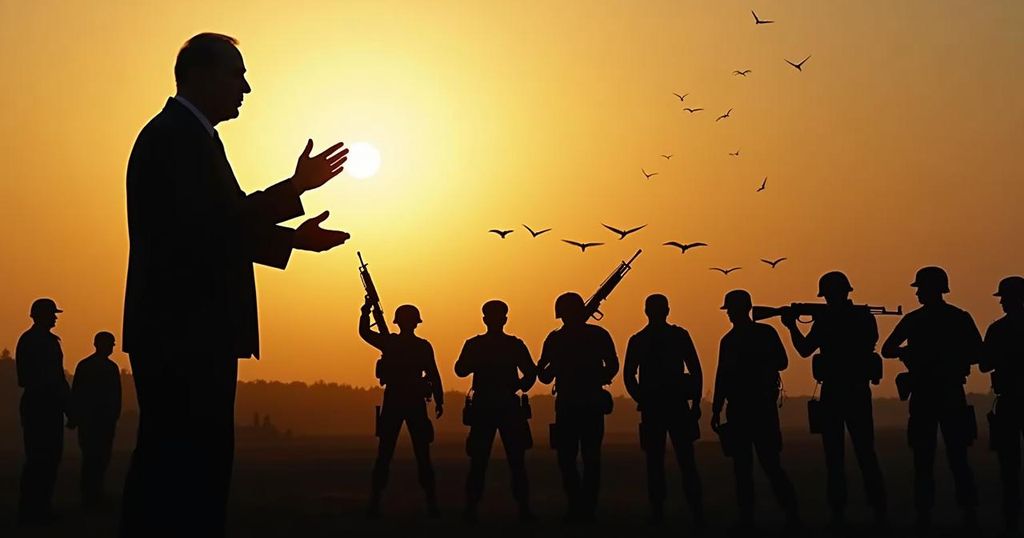Netanyahu Declares Ongoing Military Commitment Against Hezbollah at UN General Assembly

Israeli Prime Minister Benjamin Netanyahu addressed the United Nations General Assembly, affirming Israel’s intention to “degrade Hezbollah” until its goals are met and invoking the need for military action against Hamas. He faced opposition from international leaders, who condemned Israel’s military escalation amid ongoing conflict in Gaza and Lebanon, where casualties and humanitarian crises have intensified. Netanyahu positioned Israel’s military actions as necessary for national security and warned Iran against further aggression, while calls for a ceasefire continue unresolved.
During his recent address at the United Nations General Assembly, Israeli Prime Minister Benjamin Netanyahu asserted Israel’s commitment to continually “degrade Hezbollah” until the nation achieves its objectives, particularly along the Lebanon border. Netanyahu, who initially hesitated to attend the assembly, felt compelled to counter what he regarded as untruths about Israel. As Netanyahu faced backlash from various global leaders, including those from Slovenia, Barbados, and Pakistan who condemned the violence in the Middle East, he directed attention to Israel’s military engagements. He indicated that Israel would maintain its operations against both Hezbollah and Hamas until it secures a decisive victory. Following Netanyahu’s remarks, military actions escalated with Israeli airstrikes reported in Beirut. Declaring that “Israel has every right to remove this threat,” Netanyahu received applause from his supporters, even as some assembly delegates voiced their dissent. His statements came amidst ongoing international diplomatic efforts for a ceasefire, which have yet to gain traction given the ongoing hostilities in the region, exacerbated after Hezbollah’s support for Hamas following the latter’s attack on Israel on October 7. Furthermore, Netanyahu framed Iran as a destabilizing force, citing its backing of Hamas and Hezbollah while threatening consequences if Iran struck Israeli territory. His remarks were delivered against a backdrop of a humanitarian crisis in Gaza, with the ongoing conflict resulting in considerable Palestinian casualties and a significant number of individuals displaced. He reiterated that the path to peace hinged on Hamas surrendering, vowing that military actions would persist until either compliance was achieved or total victory was secured. Netanyahu’s speech significantly influenced the assembly’s climate as prior speakers criticized Israel’s military actions, effectively amplifying the calls for a curtailment of hostilities in the region. Amid the tumult in the assembly, protests against Israel’s policies were also conducted outside the venue. Netanyahu’s continued emphasis on military might in addressing regional security issues has raised questions regarding the broader ramifications for peace and stability in the Middle East as international efforts to mediate the conflict evolve further.
The context of Israeli Prime Minister Netanyahu’s address at the United Nations involves a volatile security landscape in the Middle East, influenced by ongoing conflicts with Hezbollah in Lebanon and Hamas in Gaza. His remarks come after escalated military actions have resulted in heavy casualties on both sides of the border, particularly in Gaza, where more than 41,500 Palestinians have allegedly died from military operations. Additionally, the backdrop of international diplomatic attempts to establish a ceasefire complicates the situation further, as regional leaders and various countries express growing concern over the humanitarian consequences of the conflict.
In summary, Prime Minister Netanyahu’s recent speech at the United Nations underscores Israel’s firm stance on continuing its military actions against Hezbollah and Hamas until clear objectives are achieved. Amid criticism from global leaders and the overwhelming humanitarian crises in affected areas, his address signifies a persistent reliance on military solutions as part of Israel’s security strategy, raising critical questions regarding future peace efforts and regional stability.
Original Source: apnews.com






